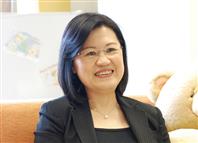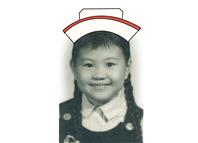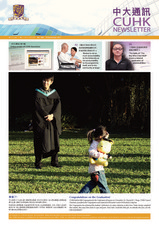How did you become acquainted with the nursing profession?
When I was an infant, my mother brought me to the maternal and child health centre for regular check-ups. The nurses there greeted me happily every time they saw me, and introduced me as a ‘model baby’ to other visiting mothers. ‘See, you can also have a chubby lovely baby if you give him/her proper care.’ One of the nurses loved me so much that she took me as her sworn daughter. Since then I became closely acquainted with the nurses at the centre and I felt very much at home there. At my tender age, I had determined to become a nurse—and I did. After working as a nurse for about four years, I was sponsored by the Government for enrolment in a nursing teacher education programme offered by the then Hong Kong Polytechnic. After teaching in a nursing school for one year, I furthered my study in the UK and joined CUHK upon return to Hong Kong.
How was it like being a nurse then, as compared to nowadays?
Nurses are the constant care service providers. We have been and will continue to be the best partner of patients, but the role of nurses has changed with societal development and the evolving medical and health care system.
First, we are not only taking care of patients’ physical well-being now, but also mental, social and spiritual aspects. Second, with the emergence of the concept of ‘hospital without walls’, the scope of our service has reached out to the community, and our clients now include patient’s family members who are usually caregivers after the patient is discharged from hospital. Third, we now act beyond the parameters of a service provider to a coordinator of the medical team, who carries out regular self-assessment on service quality.
You deliberately make a distinction between ‘nurses’ and ‘nursing attendants’. Why?
People like to address the lady at any clinic front desk and those wearing a uniform working in the hospital with the same title—‘guniang’. I just want to make the point clear. Anyone can claim to be a ‘guniang’—nursing attendant, but only those who have been professionally trained and registered can be called a nurse. The difference between the two titles is minor but it does matter with the professional positioning of nurses.
How should nursing education ride on the advantage of a university context?
In olders days, teachers in a nursing school were nurses of the hospital. The exposure of students was limited due to the unidisciplinary nature. The Nethersole School of Nursing, being housed under the umbrella of the Faculty of Medicine, is advantaged by the tremendous cross-disciplinary support. University education provides not only sound professional training, but also general education and college education for the holistic development of students, all in all contributing to the outstanding personal attributes of nurses. Our graduates may not be outstanding when they first join the nursing profession, since it takes time to adapt to the difference between classroom and the hospital ward. But as time goes, their employers’ rating will soar. Having gone through rigorous academic training, they are good at independent thinking. Once, one of our graduates on clinical practice refused to transfer medicines from a nurse’s hand to a patient because she insisted on observing the medicine administration protocol. She was criticized for being uncooperative. But wasn’t her disobedience bringing some reflection to those veteran members in the profession?
How does the School respond to changing social needs?
Seeing that the Government has no concrete solution to ease the problem of nurse shortage, and has not increased the number of funded nursing programme places, some hospitals begin to re-run nursing schools. The profession sees this as a regression after the incorporation of nurse training into tertiary education some 20 years ago, and is very upset with it. After careful deliberation, the School launched a self-funded three-year full-time Master of Science in Nursing Programme in 2009, targeting at non-nursing degree holders with working experience and an aspiration for the profession. We aimed at admitting 30 students but the response was so overwhelming that we finally took in 68.
These students brought with them knowledge from other disciplines, and their new perspectives inspired the School and our teachers. Sophisticated in human relations and communication skills, they are well received by hospitals for clinical practice and many of them have got conditional job offers in their final year of study. The rise of this new nursing ‘generation’ reveals a new direction for advancement of the nursing profession and explains to us how unwise it is to go back to a lower starting point.
What has been done to cater for the ageing population?
Twenty years from now, one of four Hong Kong citizens will be a senior of 65 years or older. Ageing is a process that we all have to go through, and so the knowledge on ageing should be common to all. Thanks to the generous sponsorship from the Hong Kong Jockey Club, the School launched the Cadenza Training Programme in 2008. Seminars and talks are organized to promote the concept of positive ageing to the community, and courses are run to train family caregivers of stroke and dementia patients. There is also a Web-based Course for Professional Health and Social Care Workers. A UGC-funded two-year full-time articulated bachelor’s degree programme in gerontology will be launched in 2012–13 for associate degree and higher diploma graduates.
You place great emphasis on primary care as the gatekeeper of health. How is the School doing in regard to this?
In cooperation with the United Christian Hospital, the Nethersole School of Nursing established the Nethersole Nursing Practice Research Unit to promote a culture of evidence-based quality nursing care. With systematic analysis of evidence and reference to international literature, we developed evidence-based nursing protocols applicable to the local context. Two of them—one for oral care and the other for foot and toenail care for older people—have been adopted by the Hospital Authority. And to promote better health management, the School established two websites to transfer knowledge on diabetes and heart diseases to the public.
What makes you proud of the School of Nursing?
My collegiate staff who work for the benefits of the School as a team. As individuals, they are not perfect. But as an entity, all staff, ranging from teaching, administrative, clerical to laboratory, work towards the same goal and contribute to the School. It’s so happy working here because I know they will face any challenge and tackle any problem with me. I am proud of my students, too. They all have a pair of skilful hands, a witty brain and a caring heart. I’m sure they will become good nurses and bring great support. 



































































































































































Social Bookmarks